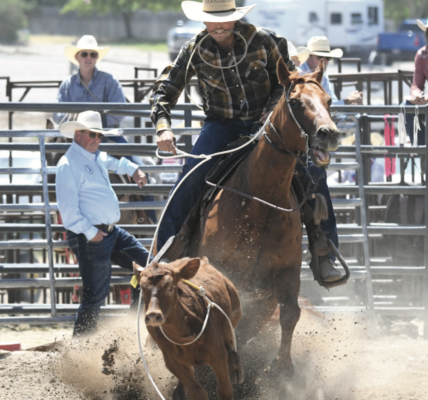
By Jasmine Hall
Wyoming Tribune Eagle
Via- Wyoming News Exchange
CHEYENNE — Gov. Mark Gordon considers salary increases meant to support state employee recruitment and retention a high priority in the 2023-24 biennium budget.
He included $53 million in his budget proposal to go toward employee compensation and emphasized how important this funding is during his presentation to the Wyoming Legislature’s Joint Appropriations Committee on Wednesday. The money is part of his $2.3 billion total general fund budget for the time period that begins July 1, 2022.
Executive branch agencies, members of the judicial branch and educational institutions across the state would receive the additional funding.
“We are hemorrhaging talent and experience,” Gordon said. “The private sector, which is always quick to respond to opportunity, is picking off some of our best and most talented.”
Currently, state employees are paid below the 2017 market compensation rate, according to Gordon, and a recent survey conducted by the Wyoming Department of Administration and Information revealed 38% of workers had a second job. A report from the same survey also found that 3% of the state workforce took advantage of SNAP, Temporary Assistance for Needy Families and other assistance services.
The governor said given inflation and the expectations placed on state government, employees should be paid more. He said he was not asking for an unreasonable amount of money for the initiative, but just enough to move the pay scale closer to market value.
“Because we are so cheap,” he said, “we continue to ask our employees to do more with less.”
He further explained how this has impacted the ability of state government agencies to provide assistance to constituents, notably in the Departments of Family Services and Workforce Services. There was also concern expressed regarding the winter season, as the region is experiencing a shortage of snow plow drivers due to low compensation.
Outside states are taking the initiative to pay their drivers more with the hope of building up their plow driver force. Gordon said Colorado plans to pay its drivers an additional $2,000, and several Massachusetts towns pay individuals $310 an hour, on top of overtime, to plow snow.
Close to $31 million of his recommendation for employee compensation would go toward state agencies that provide these services, in hopes of competing with surrounding communities.
“If you want to run government more like a business, then I guess you need to run it more like a business,” he told the committee.
His presentation is a part of a multi-week-long process to review budget requests for the upcoming biennium, which all agencies take part in. Many department heads shared Gordon’s opinion, including Department of Administration and Information Director Patricia Bach. She came before the Appropriations Committee on Thursday and said she was working collaboratively with the governor’s office to increase wages. Her department provides administrative, fiscal and human resources services to more than 20 state agencies.
Bach said due to lack of funding for salaries, many positions have had to stay vacant or employees have left for need of better pay. And when department heads search for replacements, they are often left with no applicants for months at a time. Employee morale, quality applicants, turnover costs and market lag have all been challenges.
She brought forward Electrical Trades Supervisor Damian Garibay to provide testimony on conditions in his sector, which experiences these issues.
“We feel looked down upon in this department and unappreciated for what we do for this state government,” Garibay said.
When he first started in the electrical trade nearly two decades ago, he said state jobs were sought after by everyone. He considered the pay substantial, as well as the benefits, and expressed how many wanted to retire within the state government.
Now, he said, it’s a different environment.
Many are underpaid, and the majority of employees he supervises are required to get a second job in order to make ends meet. He described an electrician who came to him asking for a pay raise in order to provide day care for his child because he was a single father. Garibay said he had to turn him away, but understood why he would need to leave his position for a better opportunity.
Another difficulty during the pandemic was there was no hazard pay provided to electrical employees who worked to service all of the buildings.
“We have taken all the safety measures we can to protect ourselves and our crews during the process,” he said. “Wearing our masks in every building we work in, spraying buildings with disinfectant as people within these buildings became sicker with COVID. Yet we never received any hazard pay or any sort of bonus, nor did we receive any recognition for being here through it all.”
Garibay said good trades maintenance crews should be behind the scenes, but not forgotten. He mentioned other service departments, such as carpentry, HVAC and plumbing being underfunded, as well, and said changes needed to be made in terms of employee compensation.
Buildings and Ground Supervisor Kristin Davidson was also supposed to speak on struggles similar to the electrical supervisor, but was not given the opportunity.
While state Sen. Drew Perkins, R-Casper, thanked Garibay for putting a face to these issues, Sen. Cheri Steinmetz, R-Lingle, said testimony such as this may be seen as lobbying, and she did not support moving away from strictly monetary discussions.
“I thought I understood coming into all of this we were just dealing with the budget,” she said. “We’re all professionals, and it was my understanding that state employees didn’t lobby the Legislature. And so, that sounded more like a lobbyist plea to me than a professional presentation of what is needed within an agency.”
The A&I director disagreed, and said she brought them up as managers to show the problems they’re experiencing related to the compensation package. Nonetheless, the department budget presentation moved forward.
Besides state agencies receiving an increase in salaries, colleges across the state are also included in the adjustment. Close to $13 million is recommended by the governor’s office for the University of Wyoming, and nearly $7 million toward community colleges.
University of Wyoming President Ed Seidel said he hopes the Legislature will reach the same conclusion as the governor.
“Because of the reductions in state appropriations to the university in recent years, there have been no broad-based compensation increases for UW staff and faculty members,” he said. “And that has caused our salaries and wages to fall further and further behind in a very competitive marketplace.”
Seidel said he considers people the most valuable asset, and this would be a good start toward bringing compensation levels closer to where they need to be to retain and recruit top performers.
Laramie County Community College President Joe Schaffer shared the same perspective, but said he still fears the raise may not be enough. With the $7 million going to multiple community colleges in Wyoming, LCCC will likely receive the traditional amount of 20% of the funding.
This comes out to be $1.4 million for the biennium, or $700,000 a year. Schaffer said with the number of employees the local college has, the current level of inflation and a large gap in comparison to market-value compensation, this won’t truly address the problem at hand.
“Through the budget cutting process, it was clear that the governor and the Legislature wanted a smaller government,” he said. “They have a smaller government, both in terms of allocation of funds, as well as people. But now we have people here who are being asked to do more, and fewer of them. And we need to take care of them.”





